Last Updated on 12 October 2024 by Cycloscope
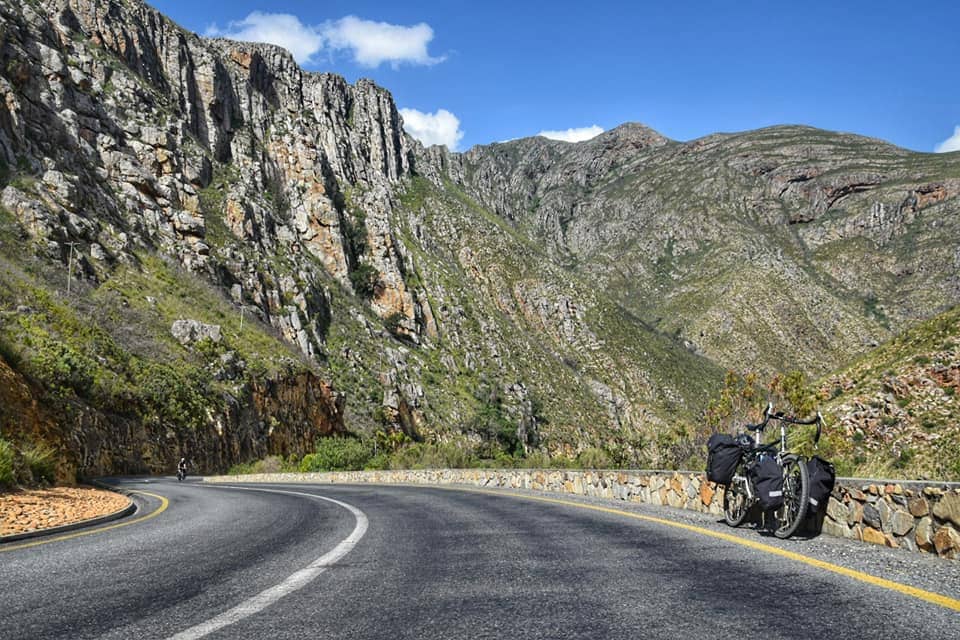
Our 390km road trip from Swellendam to Knysna
Tradouw Pass, Barrydale, the Little Karoo, and the Seven Passes Road
In this blog post, we’ll describe our road trip from Swellendam do Knysna, through the spectacular Tradouw Pass into the town of Barrydale, then crossing the Little Karoo and back towards the Garden Route and the Seven Passes Road.
Our trip was done by bicycle, but here you’ll find useful information about this route, whatever your chosen means of transport is.
This itinerary starts in Swellendam, the third oldest city in South Africa, which we described in this previous article (from Hermanus to Swellendam), and finishes in the romantic coastal city of Knysna, facing a calm and scenic lagoon.
Our journey to South Africa started in Cape Town, here are the other articles we wrote:
- Cape Town, what to see in the most beautiful African city
- From Cape Town to Hermanus, the Western Cape coast
- From Hermanus to Swellendam through Greyton and the Riversonderend nature reserve
- Knysna, Alfred Pass, R62, Garden Route and Port Elizabeth
- From Port Elizabeth to Lesotho – cycling the Eastern Cape
- Getting lost in Lesotho, a great road trip route
- Sani Pass, riding the highest road in South Africa
Check also our complete guide about
Cycling in South Africa – everything you need to know
Below the map and GPS track of our itinerary
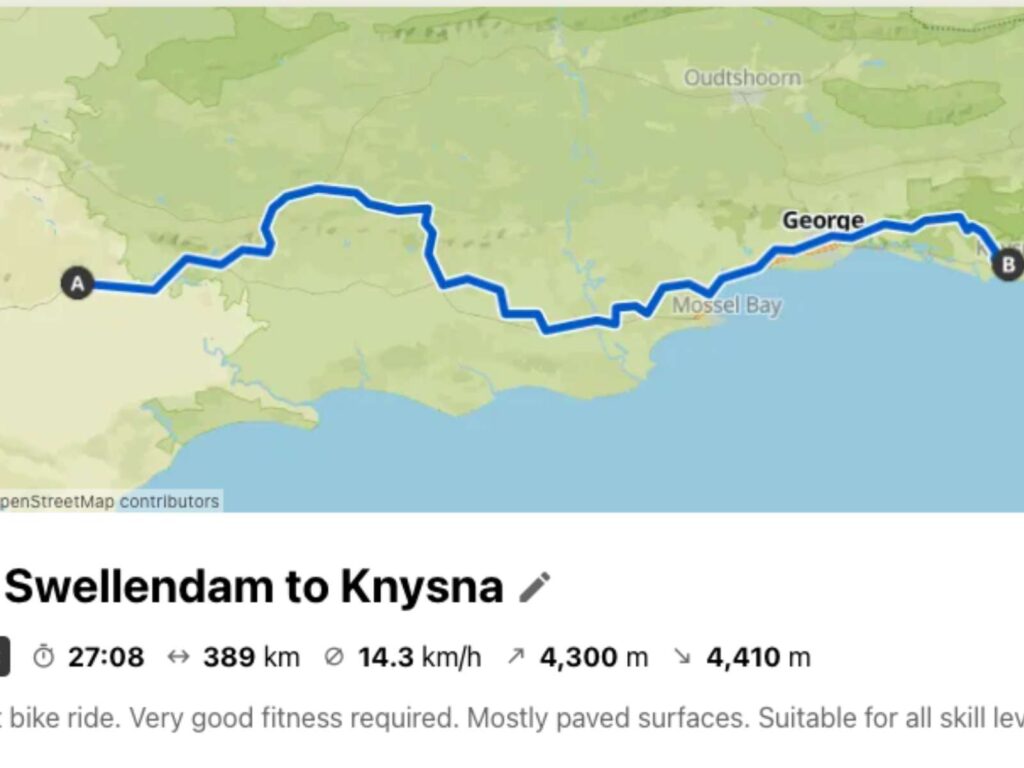
This 390km road trip brought us to very diverse sceneries, it’s amazing how quickly the landscapes can change in South Africa.
Every time we crossed a mountain pass, no matter how small, the vegetation and the soil awaiting us on the other side were completely different, we never got bored in South Africa, and this route was definitely one of our favorites.
About half of this route is unpaved, the elevation gain is significant, and the heat of the Karoo in the summer is not for the faint of heart, if you want to ride this route on a bicycle, be sure to carry enough water, this is absolutely not a beginners ride, be advised.
Even on a motorbike, some sections can be quite technical, especially if the roads are wet… mud can render some sections unpassable.
The Tradouw Pass
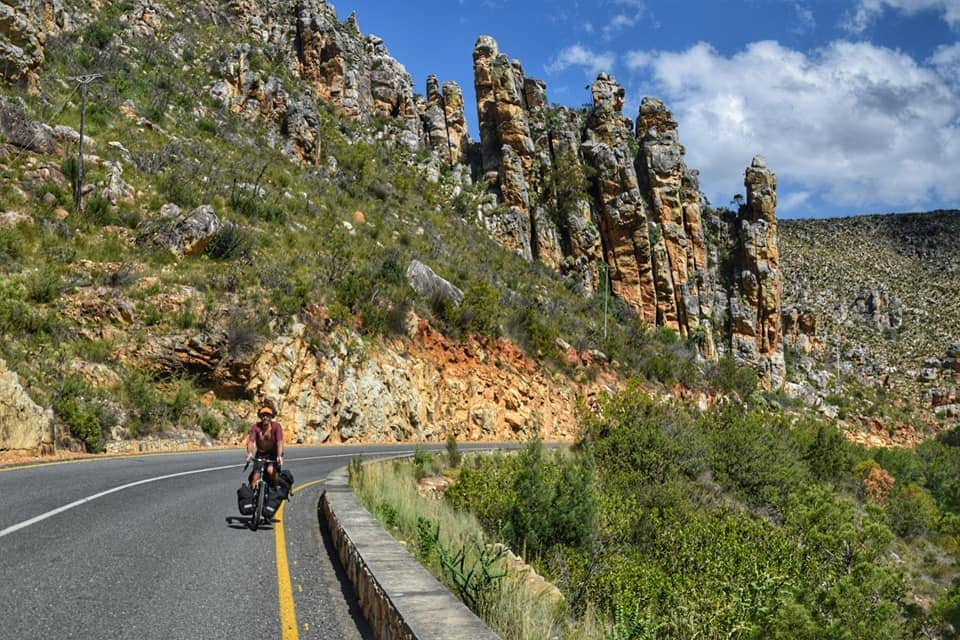
From Swellendam, we followed for about ten kilometers the highway N2 eastwards, up to the junction with the R324, less busy and quite scenic.
A colony of Sacred Ibis rests on a small tree next to a pond, the mountain range of the Zuurberg Nature Reserve is pretty, with many lines traced by waterfalls which unfortunately are dry in summer.
Drought has been a serious problem in recent years, all over the country, that’s why wasting water is one of the things you should never do in South Africa.
Before the pass begins the road goes through the village of Suurbreek, where a “colored” community struggles in dignified poverty. Old colonial houses, some a bit in dismay, outdoor fireplaces for cooking, overall a cozy and interesting hamlet. there are also several guesthouses.
Upon turning north, the road immediately begins to climb, but apart from a couple of steeper kilometers the Tradouw pass is not particularly demanding.
The first section follows the river, with even some opportunities for a quick dip in refreshing waters, but the best spots will be later onwards. Fynbos vegetation all around, a marvel in spring when the flowers bloom, but beautiful also in Summer, with its lively greens.
It’s not exactly clear where the pass is, there are two signs indicating it. Upon reaching the first, at the Drupkelder Waterfall (dry) we are suddenly surrounded by a grandiose landscape, rocky mountains of unreal looks tower above and plunge below us, always along the river Tradouw, which gives a name at the pass, with its black waters.
In the first part, the river is quite far from the road, but after passing the second waterfall, there are easy access points from which to reach the water to take a bath and wide ponds where even proper swimming is possible.
The two waterfalls also give some cool-off opportunities but unfortunately not when we were there, in the rainiest season though they create beautiful small pools.
The landscape is already very different around the big ponds, but this is just some in-between, a narrow valley separating the verdant coastal area from the Little Karoo, which lies after the next hill.
Arriving towards Barrydale indeed, the landscape suddenly becomes desertic, the colors change to more warm tones, welcome in the Karoo.
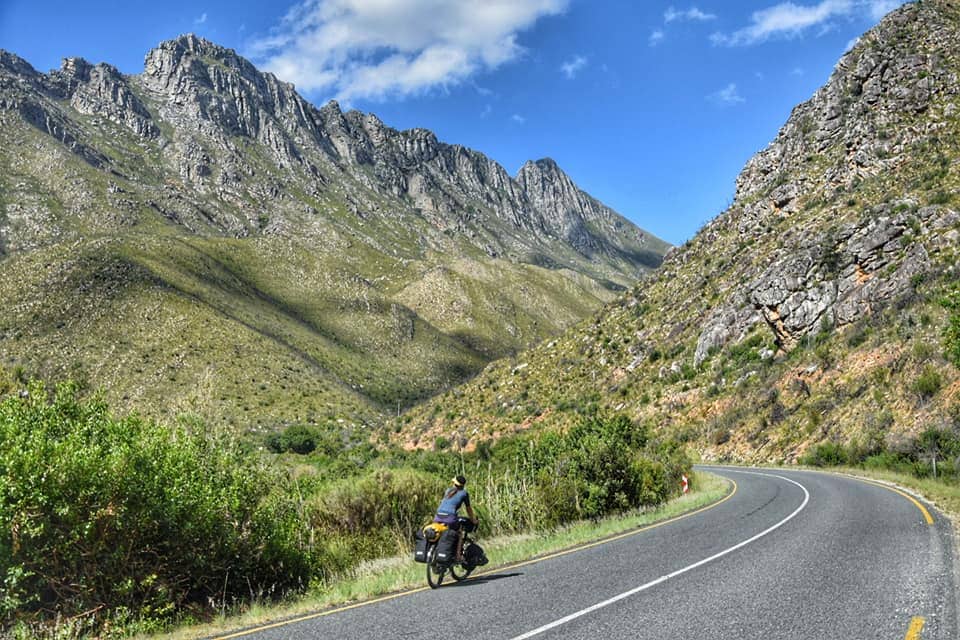
Barrydale: some things to do
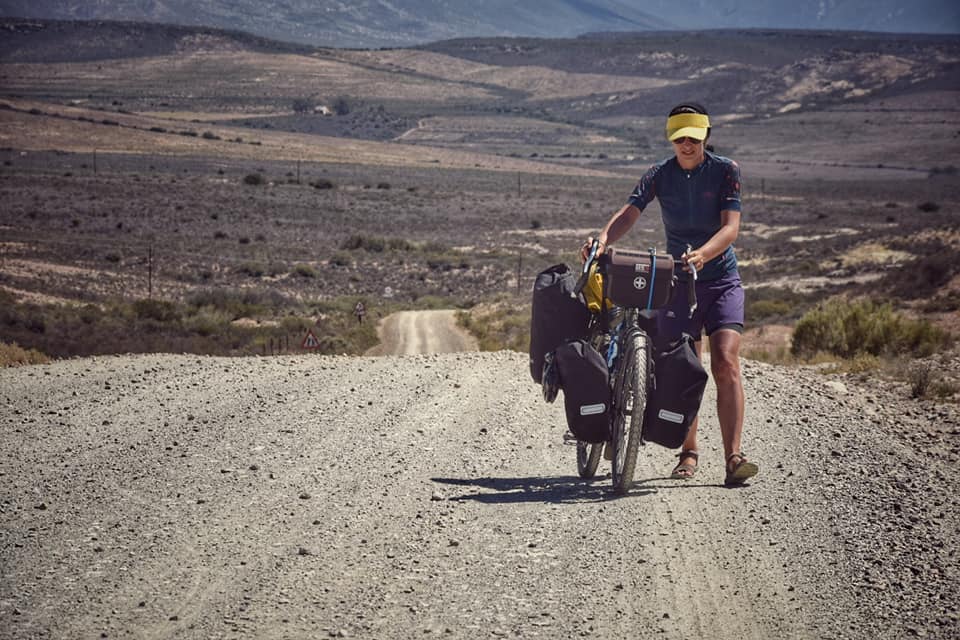
Barrydale is a tourist town where many artists live. It’s a small but lively village nestled within a dry and evocative landscape, surrounded by vineyards and farms. It lies along Route 62, the 250km-long South African version of the American Route 66, a scenic drive among the arid landscapes of the Klein (Little in Afrikaans) Karoo, connecting Ashton to Oudtshoorn.
Barrydale has a few pubs, one inside the backpackers’ hostel, several restaurants, a craft beer garden, and many guesthouses. If you go during the weekend the prices are higher and often everything is full so book first. We slept here:
But another interesting place worth spending the night in is the Karoo Art Hotel, where artworks of many local artists are displayed in a gallery but also in rooms.
Among the restaurants, the best one according to several locals we talked with, is the Country Pumpkin, a famed stop along the R62 which will greet you with a huge pumpkin sculpture.
Other attractions in Barrydale are:
- the Barrydale Hand Weavers, a woman collective creating colorful handcrafts using old-fashioned looms
- Ronnie’s Sex Shop is a weird bar with a lot of underwear hanging from the ceiling (not exactly in town though)
- the Bee Shop, a colorful local honey shop
- Hardy’s Memories of Africa, a collection of oddities and handcrafts from many African countries
The Little Karoo
From Barrydale onwards we are officially in the Klein Karoo, the two photos above were taken a few kilometers from each other, amazing how a small mountain range can separate two such different landscapes.
The Little Karoo is the southern part of the South African desert, here you still have a few small saplings, as opposed to the Big Karoo, which is more like a proper dessert.
Our itinerary continues on Route 62 for only about twenty more kilometers, the road keeps on climbing here, until reaching the vertiginous altitude of 430 masl. From here we’ll try to get a bit more off-the-beaten-track, turning east at the junction with the unmarked dirt road that leads to R323.
This road is easy to find, it passes through the village of Brandrivier and the proposed WWF reserve of Grootvadersbosch. There are about 35 kilometers of dirt road through a gorgeous arid landscape, huge ostriche farms, a small village, re-soil, and brown bushes.
Keep in mind that along the road there is neither water (except to ask some dwelling) nor shade, a few short hills are very steep and Elena almost fainted, the rare cars will cover you in the sand, some even on purpose I’m afraid… but it is really worth it if you want to get a taste of the life of the karoo. Here we spotted our first giraffes.
Actually, this road keeps on going eastwards past the R323 until it connects with the R327, where it becomes a tar road until Herbertsdale and further on to Mossel Bay, a nice alternative to the route proposed below, but you’ll be pretty far away from any proper settlement for quite some distance.
Garcia Pass to Riversdale
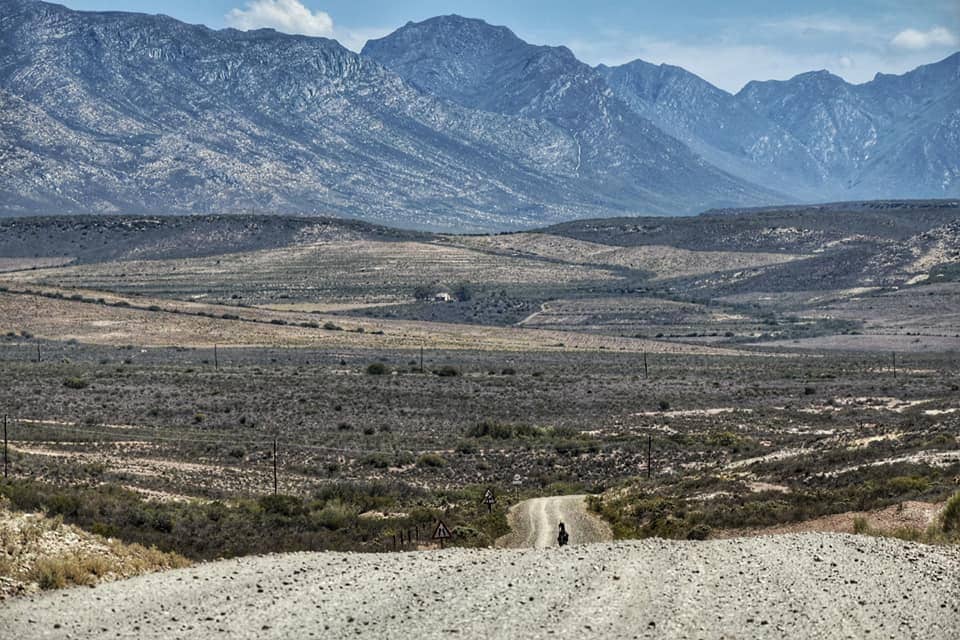
Arrived at the R323 you find the asphalt again. After a couple of kilometers towards the Garcia Pass, there is a place where we can buy some cool drinks and eat something, it is the first one since Barrydale.
From here nothing more up to Riversdale, a climb of about 10 kilometers will take you to the top of the pass, also here the landscape is very beautiful and again different. Just past a switchback, you’ll meet the fynbos again, even if as often happens in South Africa the vegetation was recovering from a recent fire, the black remainings looking like boar skin.
We leave the Karoo behind and once descending the steep road to Riversdale, everything becomes green again. From here it’s all downhill to the city of Riversdale, a big crowded town where there are many solutions for sleeping: camping, hotels, and guesthouses.
Mossel Bay
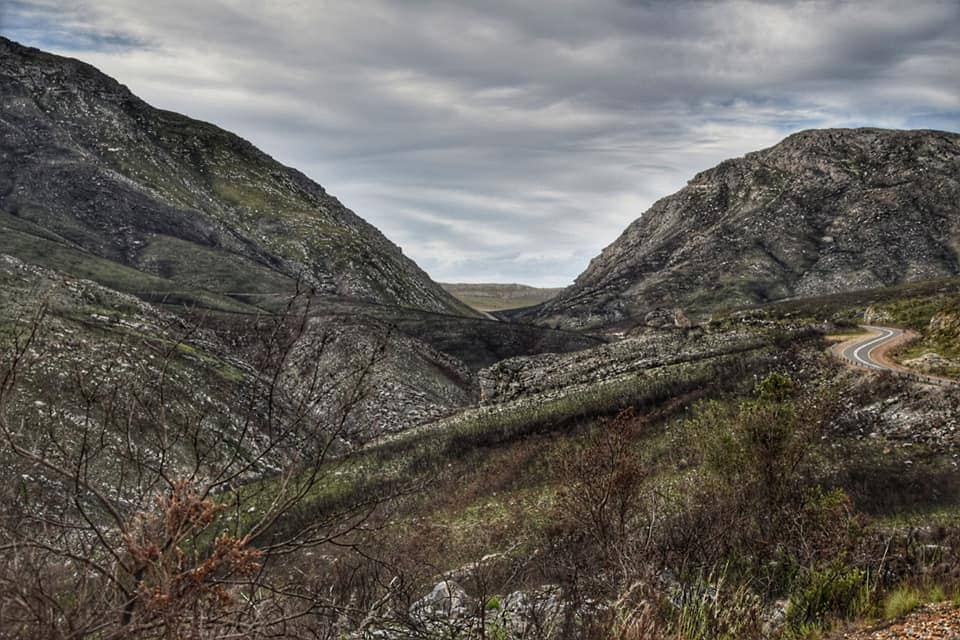
From Riversdale, we continued towards the coast, up to Mossel Bay passing through Albertinia. The quick way is to stay on the N2 highway but there is also a network of alternative dirt roads crossing cornfields where you can easily spot the blue crane, the national bird of South Africa.
Unfortunately, the dirt roads very often do not have a name but you will just have to follow the roads that are white on Google.
We did so for about 30km but then heavy rain pouring since the morning turned them into a muddy mess and we were forced on the N2, which is not totally bad after all, passing through several game reserves where we spotted zebras and antelopes.
Mosel Bay is a pretty interesting seaside town, sharply divided into a cozy white area and a chaotic and lively township.
We slept in a very nice hostel that was in the upper part of the city, at the border of the slum, the area did not seem very safe to use in the evening but inside the hostel (which also has a swimming pool and a very cheap restaurant) you will feel ok.
In the morning they offered a typical breakfast cooked on the open fire but it was a little too expensive for us and we gave up.
Seven Passes Road
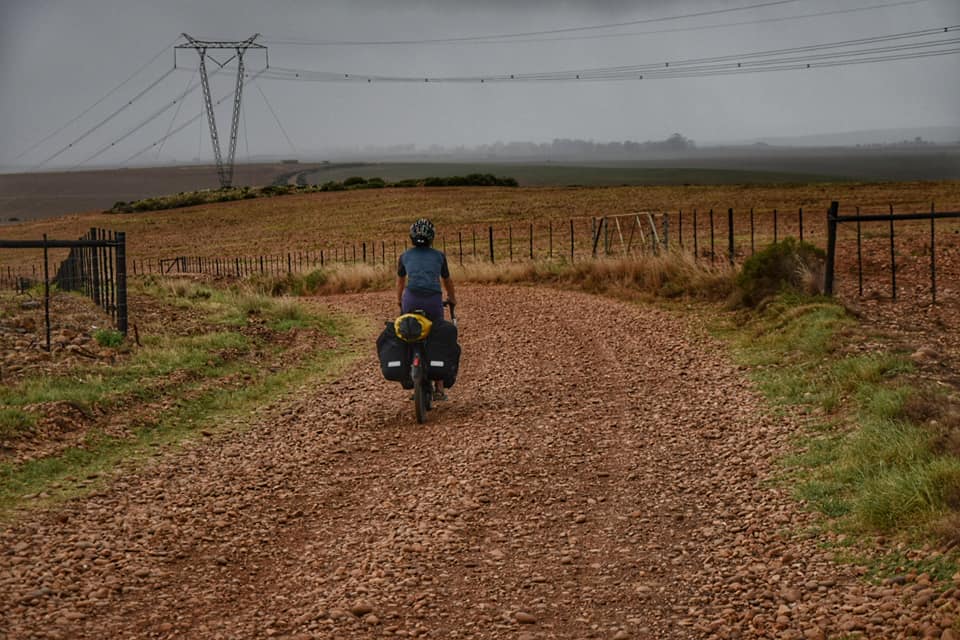
From Mossel Bay to George, we had to follow the N2 again because the alternative R101 was closed due to maintenance. There’s a short section of road with a view over the whole bay, but for the rest, it’s not the most scenic of the routes.
Once in George, we took the famous Seven Passes Road, many local riders told us about it and we had great expectations.
Paved only at times, this route should be called 7 hills more than 7 passes. It’s the old road connecting George to Knysna, not a really easy place to reach in the past.
The road goes through the lush forest (shade!), with several steep but short climbs followed by similar downhills, some corrugation makes it not super-enjoyable on fully loaded bikes, it’s tough very popular among local mountain bikers, and indeed we met a few friendly dudes.
We must say that despite the great fame it did not seem so spectacular to us, besides the initial section through the forest, you will be surrounded by fields and farms, there are some good views but definitely not even close to what we have seen so far. and the traffic is practically non-existent so it is, however, a good alternative to the highway to Knysna.
We were hosted on a beautiful farm along the road, and our cottage was surrounded by vervet monkeys, the day after it rained and because of the work in progress, the road was a quagmire.
So we took the Hoogekraal road which turned out to be surprisingly gorgeous, ranging on the hilltop with wide-open views over the forest, then coming down to an idyllic river, with even fewer cars than the 7 Passes.
This road leads to Sedgefield, just before the motorway N2 you can take a dirt road on the left that goes up to Knysna, be careful here as there are many logging tracks that are not really rideable, you’ll have to try to stay on the main one.
Knysna
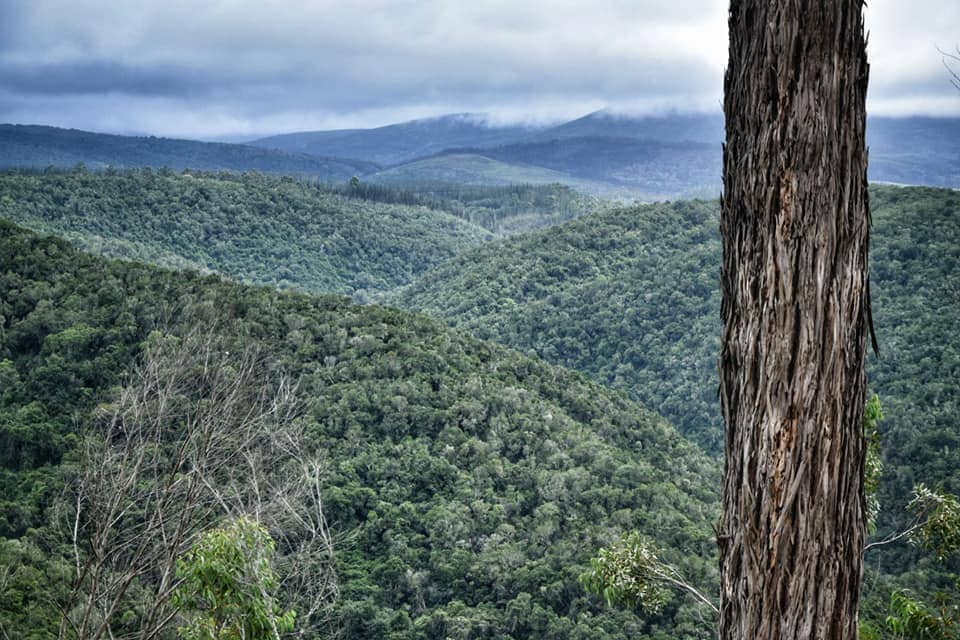
Knysna is a very pretty town that overlooks a peaceful lagoon, an ideal place to learn kite surfing. In fact, we stopped here for a couple of days and Daniele did another couple of days of lessons, finally managing to ride properly. Soon we will publish an article about it.
Knysna is inhabited by about 70,000 people and is quite touristy during the summer season, especially in December, it offers numerous solutions for sleeping but it is worth booking during the weekends (we were hosted through Warmshowers.org).
The city is recovering from a violent fire that occurred in 2017 that destroyed many houses and hotels in the highest part of the city.
Was this article helpful? Are you planning a trip to South Africa?
You may also be interested in these articles:
Cape Town, what to see in the most beautiful African city
From Cape Town to Hermanus, the Western Cape coast
From Hermanus to Swellendam through Greyton and the Riversonderend nature reserve
Learning Kitesurf in Cape Town, our experience


